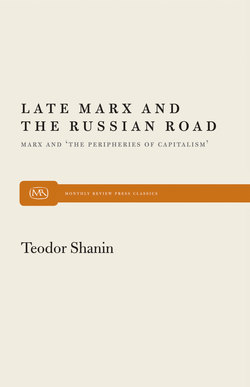Читать книгу Late Marx and the Russian Road - Теодор Шанин - Страница 7
На сайте Литреса книга снята с продажи.
ОглавлениеIntroduction
Books ideally speak for themselves. A lengthy explanation of contents may deflect attention from the book’s goal, especially so, in a volume which includes also papers of interpretation. This introduction will be brief.
The mid-part of the book is mainly given to the drafts of Marx’s 1881 discussion concerning rural Russia and some supplementary materials. The iconoclastic nature of this extraordinary piece of thinking aloud as against Marx’s earlier views and later interpretations, the peculiar history of those drafts, the relevance of them for the so-called ‘developing societies’ of today, make these papers into one of the most important intellectual ‘finds’ of the century. Their first full and direct translation into English should enable the readers to judge for themselves the extent to which Marx’s magnificent originality, foresight and heretical élan stayed with him to the very end. Bureaucrats and theologians of science in whichever camp will not like it. Good!
The book’s first part offers some interpretations of Marx’s work at the last stage of its development, relating directly to the drafts published. It is polemical and not of one cloth – in such matters critical doubt and debate are essential. It was Marx who chose as his favourite motto De omnibus dubitandum – ‘doubt everything’ – and the drafts below offer living proof of how much he was true to this principle. A way to honour his scholarship is to follow him in that.
The final part three of the book presents some materials which come to trace the intellectual bridges between Marx’s writings on Russia and the Russian revolutionary tradition. It begins with extracts from those writings of Chernyshevskii which influenced particularly and explicitly Marx’s own work. It then places before Western audiences, for once verbatim, the major programmatic and analytical statements of the People’s Will – the Russian indigenous revolutionary organisation of Marx’s own time, and a group to which Marx and Engels have consistently referred till the end as ‘our friends’. The whole movement is remembered for its heroic defiance and bombings, which seem to have obscured its achievements in the realm of theory, namely, an alternative and highly original view of society, state and revolution within the specific social context they operated in. Also, their writings offer insight into analysis which merged, rarely acknowledged, into the thought of late Marx as well as that of Lenin. Looking at the subsequent century, one is struck by the contemporary potence of many of those statements. It is as if the global history and human society were only now catching up with many of the revolutionary considerations and illuminations of the 1880s, both those of the People’s Will and Marx’s own. A discussion of interdependence between Marx’s analysis and the vernacular revolutionary tradition concludes both the section and the book while forming a link with the consideration of the socialisms of the twentieth century.
Even on first perusal of the book, the reader should keep in mind its assumption that the Russia of those times was a ‘developing’ or ‘peripheral capitalist’ society, in the sense attached to those terms today – arguably the first of its type. It is only in that light that the papers presented by Marx can be considered in their full contemporary relevance. In the same light one can see the fuller significance of Marx’s declared wish to use Russia for the Volume III of Capital the way he used England in Capital, Volume I. Also, there are clearly different conceptions of Marxism, one of which sees itself as consistent deduction from Capital, Volume I using whichever empirical evidence is handy to defend its absoluteness and its universality. The text which follows should help to transform Marx’s comment of the 1870s about himself ‘not being a Marxist’ from a sly anecdote into a major illumination of Marx’s own Marxism as against that of the first generation of his interpreters.
For the rest, the book will ‘speak for itself.
